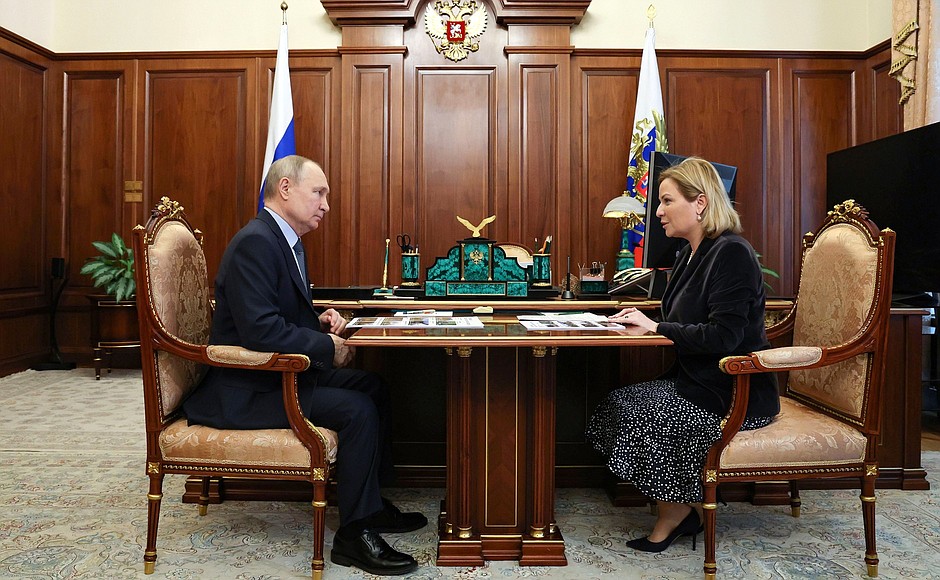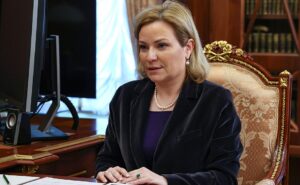
Russian President Vladimir Putin with Culture Minister Olga Lyubimova in Kremlin today.
Moscow: The contested Donbass region in eastern Ukraine is split in two between Russia-backed “People’s Republics” of Donetsk and Luhansk and the podkontrolny (under control) Donbass. It was on February 21, 2022, Russian President Vladimir Putin recognized the independence of the self-proclaimed People’s Republics of Donetsk and Luhansk, and three days later Russian troops invaded Ukraine from Crimea, Belarus, and southwestern Russia to fight against Ukrainian authorities’ “aggression in Donbass”. Later, on September 30, 2022, Putin delivered an address announcing the annexation of Donetsk, Luhansk, Kherson, and Zaporizhzhya oblasti by Russia.
As Russia’s war in Ukraine continues, Russia has now taken the cultural route to winning over the people in the Donbass region. Putin has assigned special tasks to Russia’s Ministry of Culture and created outreach teams that visit regions, hospitals and rehabilitation centres to support the soldiers where the Defence Ministry allows them to come.

“We send as many people as can be of help and delight people with their performances,” Russian Culture Minister Olga Lyubimova told President Putin during a briefing in Kremlin here on July 5, 2023.
Besides, while referring to these “new areas” of her ministry’s engagement, Olga said her ministry was reviving libraries, theatres and concert halls, museums, virtual halls, and culture centres there.
“I want to mention the fact that people join a queue to take part in our road shows, which is yet another significant point. We constantly receive applications from performers in different age groups working in various genres who want to do their bit and support both the new regions and our soldiers,” she told Putin.
Russia plans to build 14 libraries, 15 theatres, 11 museums, 10 online museums and 40 cultural centres in the Donbass region this year. Each federal museum has volunteered to help the “new regions”. Six federal libraries are providing comprehensive assistance to 995 local libraries.
Next, it has plans for cinemas. Before February 2022, there were only two cinemas in Donbass. Olga said there are 21 of them now, and all of them are open to the public. “Children there watch the same films we watch here. We talk about who liked Cheburashka, and who is looking forward to a sequel. They have the same questions for our colleagues in the new regions as children in other Russian regions,” she said.
Russia further plans to open an additional 28 cinemas there by the end of the year. “The fact is, there is going to be a chain of cinemas that will open by December,” Olga told Putin. She also highlighted another “important ” aspect – Apart from films that are running now, there was a demand for Russia’s golden collections. “The Gosfilmofond film archive and the Mosfilm and Lenfilm studios provide modern high-quality digitised films, but there are also our old Soviet films that whole families can watch,” she said, adding, “We have started doing this in some parts”.
Olga cited the example of Shakhtarsk, a city in Donetsk Oblast, eastern Ukraine, currently occupied by Russia, where there is a cinema and television college with a small screening room. “We are building a large cinema there. It will open for children by September, and adults will be able to watch films there in the afternoon. It is a combination of learning and enjoying cinema. The VGIK [the Gerasimov Institute of Cinematography] will help and is helping us a lot,” she told Putin. Russia also plans to open there a small museum together with the Cinema Museum and Gosfilmofond, which will become a community space open to everyone. The place never had a cinema before.
“Of course, such things are extremely important for the new regions and for our sector as a whole,” Olga said.
Interestingly, during their discussion, Putin told Olga that he regretted he had no opportunity to see social facilities when he visited the Kherson Region and the Lugansk People’s Republic on April 18, 2023. “But it was clear that where there were no hostilities, where the situation was more or less stable, everything was clean and tidied up. But, of course, the facilities themselves – you can’t see much from a car or a helicopter – the facilities themselves, as I know, need support, restoration and renovation at the modern level in the same way as it is being done in many places in Russia,” he told Olga.
– global bihari bureau





